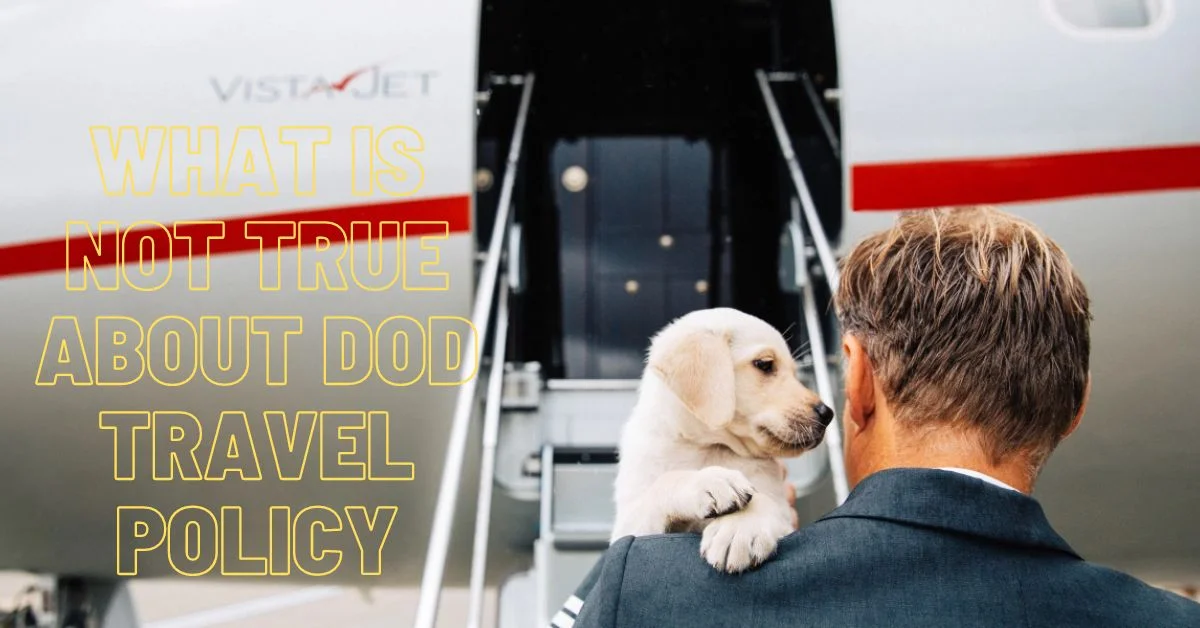Table of Contents
Introduction
What Is Not True About DoD Travel Policy, Travel policies play a pivotal role in upholding order and accountability, particularly within the frameworks of large organizations. The Department of Defense (DoD), standing as a major government institution in the United States, has enacted a comprehensive travel policy to supervise and guide the travel activities of its personnel. However, intricate systems often foster misconceptions and misunderstandings regarding the DoD’s travel policy. This article endeavors to delve into these misconceptions and shed light on the aspects of DoD travel policy that do not align with common misconceptions.
Video For You:
Misconception 1: Uniformity in DoD Travel Policy
A prevalent misunderstanding concerning the DoD’s travel policy revolves around the assumption that it operates as a uniform, one-size-fits-all approach applicable to all DoD personnel. In reality, this policy exhibits a nuanced nature. The DoD acknowledges the diversity within its personnel, encompassing individuals with distinct roles, responsibilities, and travel prerequisites.
For instance, the travel needs of a civilian employee attending a conference vary significantly from those of a military service member deployed on a mission. The DoD travel policy takes into account these differences, providing specific guidelines and regulations tailored to different categories of personnel. (What Is Not True About DoD Travel Policy)
Misconception 2: Complete Reimbursement of Travel Expenses

personnel are entirely covered by the government. The Department of Defense (DoD) offers compensation for authorized official travel expenses. You’ve gotta get this straight – not all your bills can come back to you in full. Nope, there are some rules you gotta follow.
Most times, you can ask for your money back for stuff like grub, a place to crash, and getting around. But, here’s the kicker, it depends on the rates set for where you’re heading. And let me tell ya, those rates, they like to dance around a bit. It’s imperative to understand that there are constraints on other types of outlays, and individuals must rigorously adhere to precise guidelines and regulations to qualify for reimbursement. (What Is Not True About DoD Travel Policy)
Misconception 3: Travel Advances Are Automatically Granted
(What Is Not True About DoD Travel Policy) Some individuals believe that they will automatically receive travel advances before embarking on official travel. A travel advance is essentially a prepayment to cover anticipated travel expenses. While travel advances are available to DoD personnel, they are not granted automatically.
To obtain a travel advance, personnel must follow a formal request process, providing documentation that justifies the need for an advance. This documentation typically includes a travel order, an estimated travel itinerary, and a breakdown of expected expenses. Travel advances are subject to approval and are not guaranteed for every trip. (What Is Not True About DoD Travel Policy)
Misconception 4: Travel Policy Is Immune to Change
There is a common misconception that DoD travel policy remains static and unchanging. In reality, travel policies, like any other government regulations, are subject to updates and revisions. The DoD consistently assesses and adapts its travel protocols in response to evolving circumstances, including alterations in government regulations, budgetary considerations, and security priorities.
It is imperative for DoD personnel to remain well-informed regarding any modifications to the travel policy, as a lack of awareness can lead to non-compliance. Unfamiliarity with policy adjustments is not a valid excuse for failing to adhere, making it essential for individuals to routinely refer to authoritative sources to stay current. (What Is Not True About DoD Travel Policy)
Misconception 5: The Misguided Belief That DoD Personnel Can Exploit Government Travel Resources for Personal Excursions
There exists a mistaken notion among some individuals that they can utilize government travel assets, such as military aircraft or government-contracted accommodations, for personal journeys without facing consequences. This misconception carries serious ramifications, as the inappropriate use of government resources violates ethical standards and can lead to disciplinary measures. (What Is Not True About DoD Travel Policy)
DoD travel policy explicitly distinguishes between official and personal travel. While there are allowances for combining personal travel with official travel, it is essential to follow the guidelines and obtain proper authorizations. Misusing government resources for personal gain is strictly prohibited. (What Is Not True About DoD Travel Policy)
Misconception 6: Travel Policy Only Applies Within the United States
A prevalent misconception is the idea that the DoD travel policy exclusively relates to travel within the United States. In truth, this policy is relevant to all official travel, whether it occurs domestically or abroad. International travel, in particular, entails extra factors to consider, including passport and visa prerequisites, security clearances, and foreign currency transactions. Personnel embarking on international travel must adhere to the specific regulations and requirements outlined in the DoD travel policy, which can vary significantly from those applicable to domestic travel. (What Is Not True About DoD Travel Policy)
Misconception 7: The DoD Will Always Cover Medical Expenses Incurred During Travel

It is a widespread misconception that the DoD will automatically cover all medical expenses incurred during official travel. Although the DoD offers specific health insurance benefits to its personnel, it’s important to note that coverage may not encompass every medical scenario. (What Is Not True About DoD Travel Policy)
For instance, the DoD might not provide coverage for medical costs associated with pre-existing conditions or elective procedures. Additionally, individuals must ensure they have proper medical documentation and approvals for any required medical treatments during official travel. Relying solely on DoD coverage without proper preparation can lead to financial burdens and complications. (What Is Not True About DoD Travel Policy)
Misconception 8: Travel Policy Is Solely About Regulations
The DoD’s travel policy not only comprises regulations and guidelines for official travel but also embodies the principles of ethics, integrity, and responsible management of government resources. It’s not just a rulebook to follow but a reflection of DoD’s values and expectations.
DoD employees must maintain the utmost ethical standards in their travel activities, which encompass honest expense reporting, conscientious use of government resources, and adherence to all pertinent laws and regulations. Ethical breaches can result in severe consequences, including disciplinary
actions.(What Is Not True About DoD Travel Policy)
Final Thought
In Conclusion, misunderstandings regarding the Department of Defense travel policy can lead to non-compliance, financial challenges, and even ethical transgressions. It is crucial for DoD personnel to acquaint themselves with the actual policies and regulations governing official travel and to seek guidance when uncertain. (What Is Not True About DoD Travel Policy)
Understanding what is not true about DoD travel policy is as important as understanding what is true. By dispelling these misconceptions and promoting a clear understanding of the policy, DoD personnel can travel more effectively and responsibly, ensuring they remain in compliance with the DoD’s expectations and requirements. For more information please visit home.
Certainly, here are four frequently asked questions (FAQs) related to “What Is Not True About DoD Travel Policy”:
1. Which of the following is not true about booking official flights?
The answer to this question will depend on the options provided in the context of the question. Please provide the options, and I’ll be happy to tell you which one is not true.
2. Which of the following is not included in the per diem rate when traveling in CONUS (Continental United States) according to Quizlet?
The specific items not included in the per diem rate can vary, but common exclusions might be personal entertainment, alcohol, and personal phone calls. The exact details may depend on the current regulations and guidelines.
3. What is one of the advantages of the GSA city pair flights?
One of the advantages of GSA (General Services Administration) city pair flights is that they offer reduced government rates and pre-negotiated fares for official travel, which can result in cost savings for government agencies.
4. What if the Joint Travel Regulations (JTR) doesn’t mention an item?
If an item or expense is not mentioned in the Joint Travel Regulations (JTR), it typically means that it is not specifically addressed or regulated by the JTR. In such cases, agencies or travelers should follow their internal guidelines and regulations while ensuring that expenses are reasonable, necessary, and directly related to official travel.




